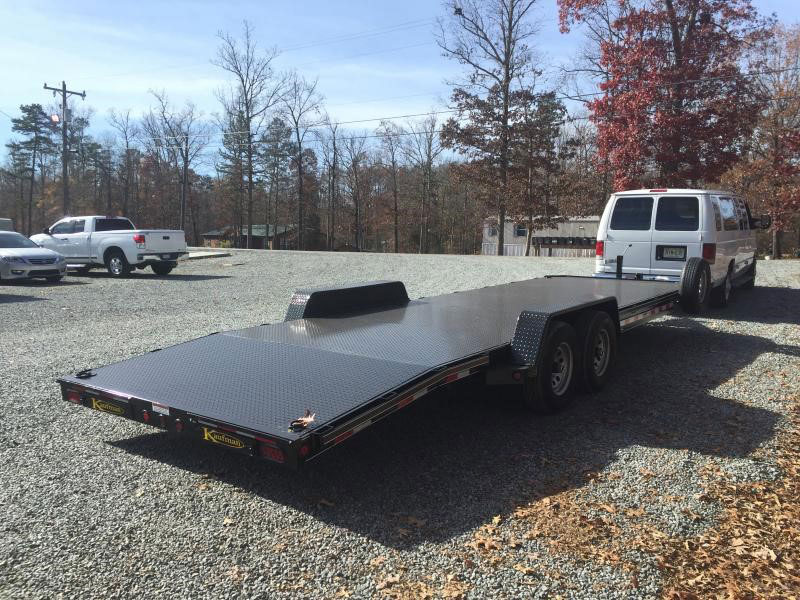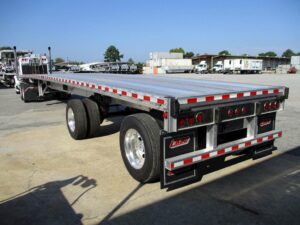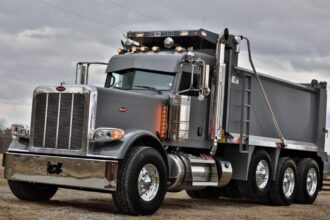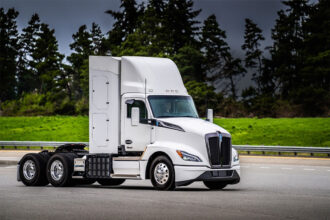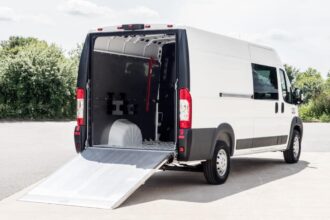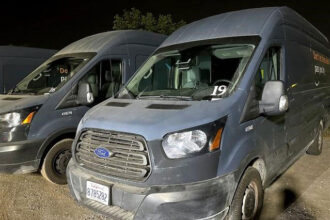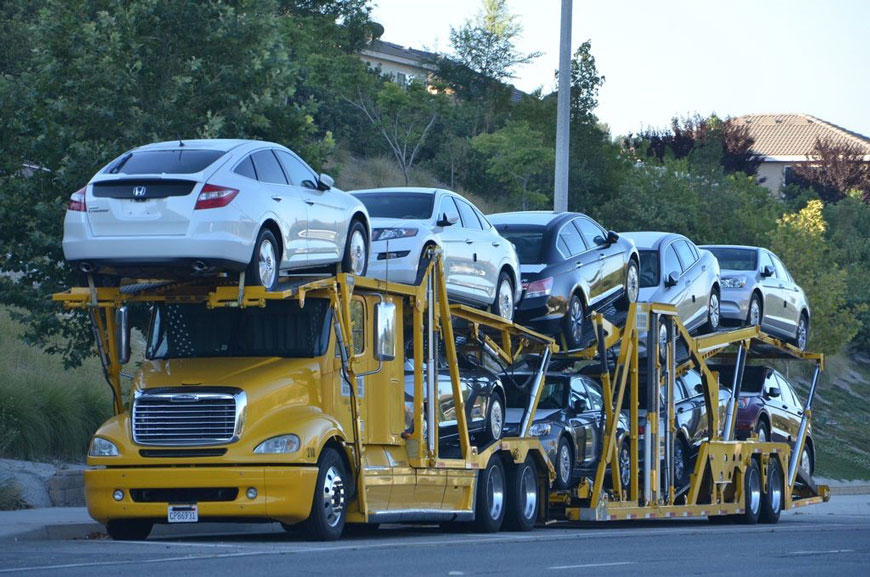Table of Contents
Are you ready to take your business to the next level? Imagine the possibilities of owning a versatile and powerful flatbed trailer. In the world of logistics and transport, a flatbed trailer is like a blank canvas for your entrepreneurial aspirations. If you’re wondering what a flatbed trailer is, it’s essentially a versatile and open trailer with a flat, unenclosed platform. These trailers are a favorite among businesses that transport oversized or irregularly shaped cargo, from construction equipment to heavy machinery. They provide the flexibility and durability needed to handle the toughest of transport challenges.
Now, the burning question: how can you get your hands on the perfect flatbed trailer for your business? You’ve come to the right place. Explore the critical decisions you need to make, from setting a budget to understanding the legal requirements. Get ready to learn how to make a smart investment, choose the right trailer, and embark on a journey toward expanding your business horizons.
To buy a flatbed trailer for your business:
- Determine Your Business Needs
- Set A Budget
- Choose Between New Or Used
- Research Suppliers
- Inspect The Trailer
- Review The Trailer’s History
- Consider Customization
- Verify The Title And Documentation
- Negotiate The Price
- Arrange Financing
- Factors In Operating Costs
- Understand Legal Requirements
- Manage Transport And Delivery
- Consider Warranty Options
- Establish A Maintenance Plan
- Finalize The Purchase
- Secure Appropriate Insurance
- Register Your Business
Recap
1. Determine Your Business Needs
To embark on a successful venture into flatbed trailers for business, consider your business’s unique requirements. For example, if you’re in the construction industry, you might need a trailer with ramps for loading heavy equipment. Understanding your specific needs ensures you invest in the right trailer.
2. Set A Budget
To ensure your budget aligns with your trailer purchase, determine your budget by considering not only the purchase cost but also ongoing expenses. For instance, a new flatbed trailer can range from $20,000 to $40,000, and used ones might be more budget-friendly, averaging around $10,000 to $15,000. Keep in mind additional costs like taxes, registration fees, and insurance.
3. Choose Between New Or Used
To guarantee a smooth transaction when purchasing a flatbed trailer, it’s essential to choose between new and used options, each with its own distinct advantages. New trailers are often accompanied by warranties and the latest features, offering a higher level of reliability. They are generally free from wear and tear, ensuring a long-lasting investment. On the other hand, used trailers can be significantly cheaper, making them an attractive choice if you’re working with a tighter budget. For example, if your budget is around $15,000, you can explore a range of used flatbed trailers that meet your needs. It’s crucial to weigh these factors against your financial resources and the specific requirements of your business to make the best decision.
4. Complete and Submit the BOC-3 ForResearch suppliers
To optimize the functionality of your trailer, look for reliable suppliers and dealers in your region. For example, ABC Trailer Manufacturers is known for their well-constructed flatbed trailers, both new and used. Research helps ensure you’re dealing with a reputable company.
5. Inspect The Trailer
To protect your investment, pay close attention to critical components during the inspection. For example, check the tires for tread wear. If you notice uneven wear patterns, it might indicate suspension or alignment issues. This type of inspection ensures you’re getting a reliable trailer.
6. Review The Trailer's History
To delve deeper into the trailer’s history, especially when considering used options, request maintenance records. These records provide essential insights into its maintenance and servicing history. They allow you to verify whether the trailer has received regular upkeep, like oil changes and brake inspections, ensuring its overall condition aligns with your business needs and quality standards. This diligent review of maintenance records empowers you to make an informed decision regarding the trailer’s reliability and whether it suits your specific business requirements.
7. Consider Customization
To embark on a successful venture into flatbed trailers for business, utilize customizations to improve the trailer’s efficiency. Let’s say you’re in the agricultural business. Adding removable sides to your flatbed trailer can make it versatile for different types of cargo. Consider what customizations will benefit your business.
8. Verify The Title And Documentation
To provide a safety net for your investment, ensure that the trailer’s title is clear and that all documents, including the bill of sale and maintenance records, are in order. This step guarantees you have legal ownership and all the necessary paperwork.
9. Negotiate The Price
To secure the best option for your purchase, negotiate the price to ensure compliance and legal operation. Negotiating can lead to substantial cost savings, an essential aspect of investing in a straight truck for your business. For example, if you’re considering purchasing a used truck listed at $12,000, engaging in negotiations might successfully bring the price down to $10,500, saving you $1,500. Engage confidently in negotiations to secure the best deal possible, effectively optimizing your budget and resources for your business’s growth and efficiency.
10. Arrange Financing
To save on costs, if your budget doesn’t cover the entire cost, it’s wise to explore financing options. Local banks, credit unions, or specialized equipment financing companies can assist you in securing the necessary funds. For instance, DEF Equipment Finance, a well-regarded financial institution with expertise in the trucking industry, can provide tailored financing solutions that align with your budget and business goals. Their competitive rates and flexible terms make it easier to acquire your flatbed trailer, ensuring a smooth transition to bolstering your business operations.
11. Factors In Operating Costs
To delve deeper into the trailer purchase process, consider the ongoing operating costs. Beyond the purchase price, take a comprehensive look at the expenses that will be part of your ownership. This includes fuel for your trips, regular maintenance to keep the trailer in top shape, insurance premiums to safeguard your investment, and registration fees to ensure compliance with legal requirements. By calculating and factoring in these operating costs, you can make informed decisions to guarantee that they align seamlessly with your budget, preventing any unforeseen financial burdens down the road.
12. Understand legal requirements
To stay on the right side of the law, be aware of your state’s and federal regulations regarding the weight and dimensions of your trailer. For example, the Federal Motor Carrier Safety Administration (FMCSA) stipulates weight limits for commercial vehicles to ensure road safety and compliance.
13. Manage transport and delivery
To bring your new trailer to your location, plan how the trailer will reach your business location. Local logistics companies, such as GHI Transportation, can transport the trailer safely and efficiently.
14. Consider Warranty Options
To avoid unexpected financial surprises, utilize warranty options. New trailers often come with warranties. For instance, if you purchase a new flatbed trailer from ABC Trailer Manufacturers, it might include a warranty for parts and service. Warranty considerations offer you protection against unexpected repairs.
15. Establish A Maintenance Plan
To extend your trailer’s lifespan, establish a schedule for inspections, lubrication, and part replacements. Regular maintenance is essential for the longevity of your trailer. Local service centers like LMN Trailer Repairs can help you maintain your trailer and keep it in optimal condition.
16. Finalize The Purchase
To close the deal, finalize the purchase after negotiations by signing the sales agreement, paying for the trailer, and obtaining the keys and necessary documents.
17. Secure Appropriate Insurance
To learn more about the trailer purchase process, protect your investment with suitable insurance. For example, Liberty Commercial Insurance specializes in commercial vehicle insurance. It can help you find coverage that suits your business and your new trailer.
18. Register Your Business
To navigate the market, ensure your business is registered with the relevant authorities and complies with regulations. This includes registering your trailer and obtaining any necessary permits.
Recap
To buy a flatbed trailer for your business, understand your unique business needs set a budget, choose between new or used trailers, research reliable suppliers, conduct thorough inspections, and consider customization with this treasure trove of knowledge to make an informed decision. Beyond the purchase, be well-prepared to manage ongoing operating costs, navigate legal requirements, and effectively handle transport and delivery logistics. Also, understanding warranty options and the importance of a maintenance plan ensures your investment’s longevity. Lastly, secure the right insurance and register your business appropriately. Armed with these insights, you’re primed to make a savvy and profitable investment. Whether you’re expanding your existing venture or embarking on a new journey, this guide equips you with the skills and wisdom needed to navigate the complex world of trailer acquisition. So, take that first step and set your business on the path to growth, efficiency, and prosperity with the perfect flatbed trailer by your side.


